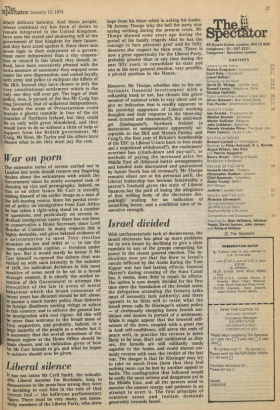Israel divided
With uncharacteristic lack of decisiveness, the Israeli electorate has piled up more problems for its own future by declining to give a clear mandate to any of the groups competing for power in the recent general election. The indications now are that the blow to Israel's morale inflicted by the Arabs during the Yom Kippur war has had lasting effects: General Sharon's daring crossing of the Suez Canal has, it seems, done little to repair its effects. The nation is now deeply divided for the first time since the foundation of the Jewish state; the delegation attending the Geneva talks must of necessity lack authority; and there appears to be little will to resist what the Israeli press calls Dr Kissinger's salami policy — of continually chopping down Jewish ambitions and desires in pursuit of a settlement. While it might appear that the lowered selfesteem of the Jews, coupled with a great rise in Arab self-confidence, will serve the ends of peace well, in practice the reverse is more likely to be true. Hurt and embittered as they are, the Israelis are still militarily vastly superior to the Arabs, and could almost certainly reverse with ease the verdict of the last war. The danger is that Dr Kissinger may try to take so much from them that they feel nothing more can be lost by another appeal to battle. The conflagration that followed would be easily the most serious and dangerous yet in the Middle East, and all the powers need to exercise the utmost energy and patience in an attempt to avert it. The first principle of common sense and realism demands generosity towards Israel.


































 Previous page
Previous page